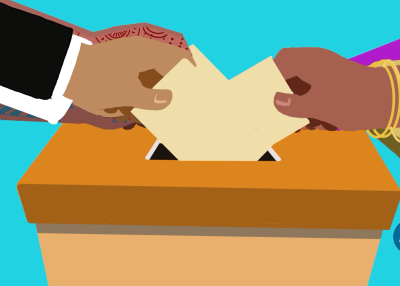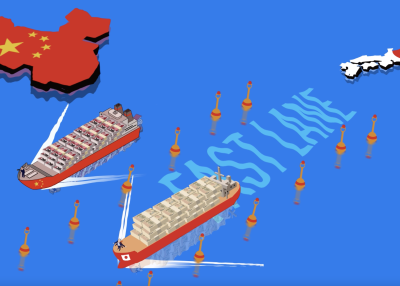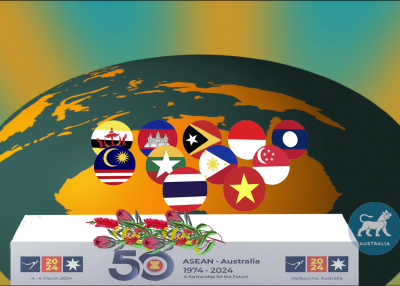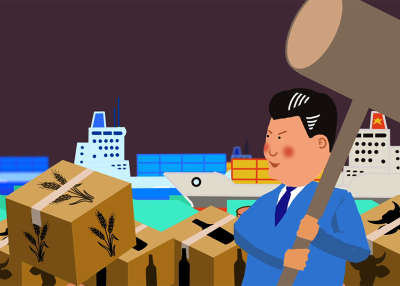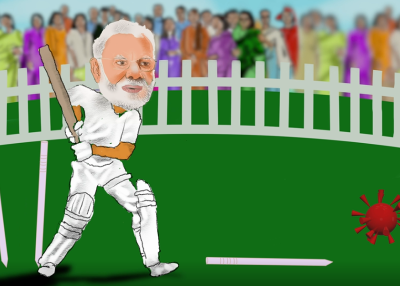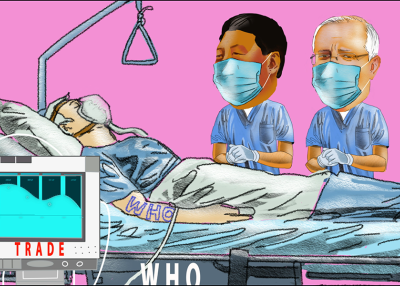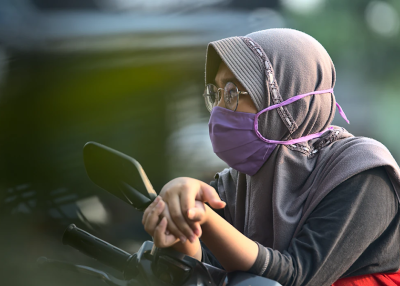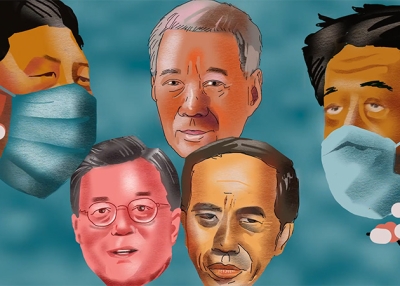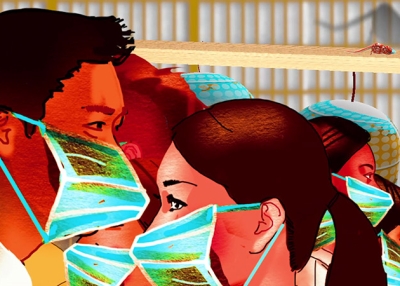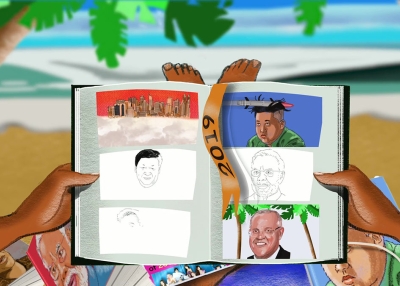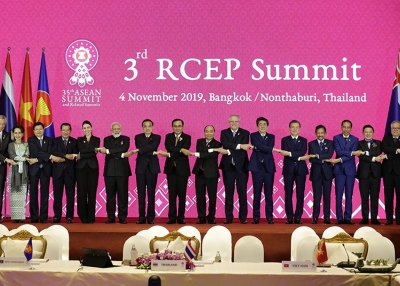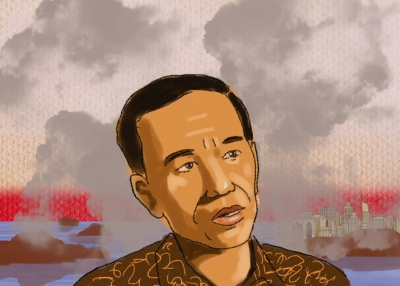Briefing MONTHLY #13 | January 2019
India & Indonesia vote | China troubles | Diplomacy c1996
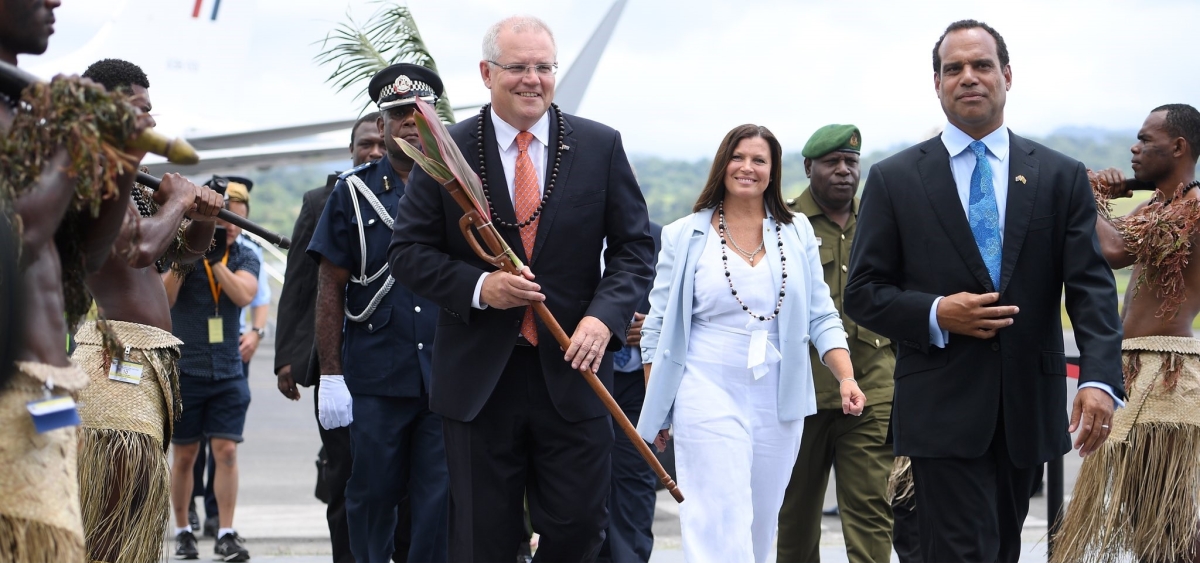
Staking a claim …. Prime Minister Scott Morrison, his wife Jenny and Vanuatu Foreign Minister, Ralph Regenvanu on the first Australian prime ministerial visit to Port Vila in almost 20 years. Morrison is fashioning a political legacy in the South Pacific with his Pacific Step Up program. See how his predecessors stepped out below. Picture: AAP
FESTIVAL OF DEMOCRACY
One billion people get to vote in India and Indonesia in April/May in the biggest joint exercise of democracy ever, something that deserves more attention in a world focussed on the failures of the traditional flagship models in Washington and London. BRIEFING MONTHLY will be doing that.
INDONESIA’S FACE OF THE FUTURE
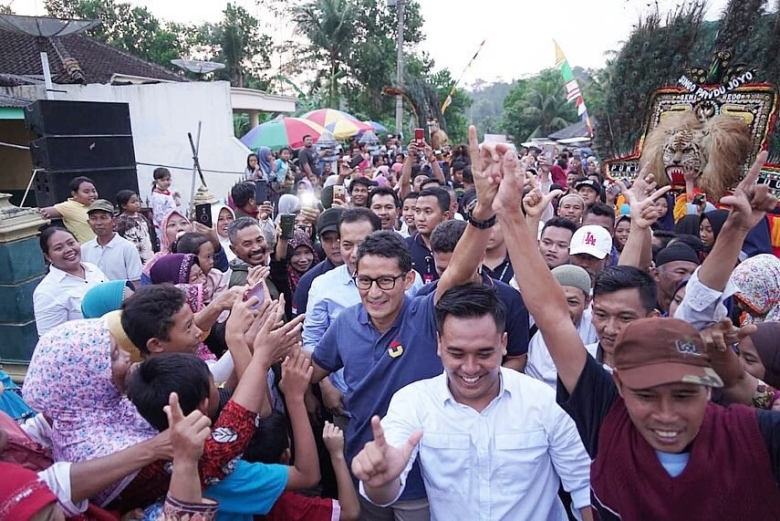
Looking forward … Sandiaga Uno (in purple shirt) campaigning in East Java
The most interesting candidate in the Indonesian election so far is Sandiaga Uno, the 49-year-old businessman running as potential vice-president with the alternative presidential candidate Prabowo Subianto. Sandi (as he is known) provided the most energetic performance in the first election debate giving his rather static leader an on camera shoulder massage. He is threatening to steal President Joko Widodo’s man-of-the-people image by usurping his trademark impromptu visits to markets to talk about hip pocket issues and he may well draw youth voters across to Prabowo, despite the former general’s Islamic hardliner and authoritarian image. But with Jokowi well ahead in the polls, where is Sandi really headed? Probably to the top of the 2024 presidential candidate list. His (and Prabowo’s) Gerindra Party will likely do well in the legislative elections and maybe even in a governing coalition. Sandi is reportedly investing more money in the campaign than Prabowo’s old backers. And the debates will establish him as the only 2019 candidate with a future. Listen to this New Mandala podcast with Eve Warburton and Tom Power.
INDIA’S TROUBLED JOBS MARKET
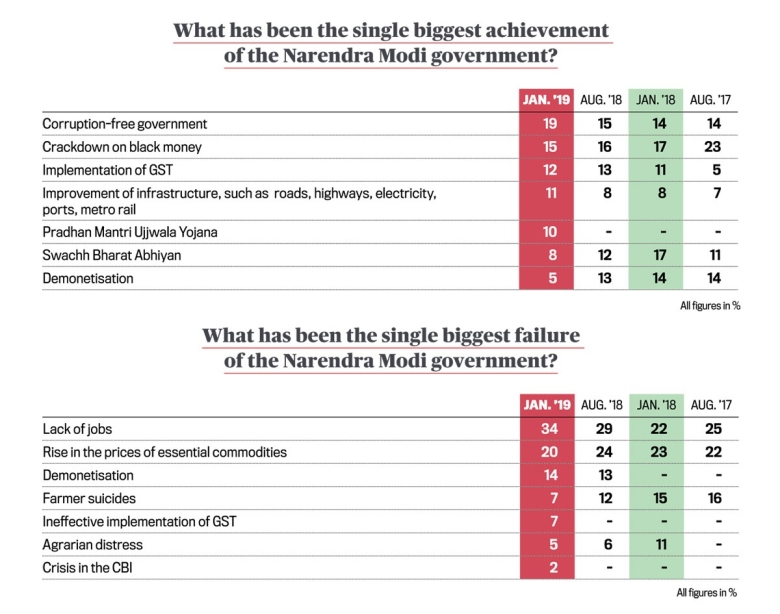
Source: India Today
Despite living in the much vaunted world’s fastest growing major economy, Indians have turned pessimistic on employment and that is suddenly raising questions about Prime Minister Narendra Modi’s own job. Last Friday’s annual Budget curiously didn’t offer any new ideas on employment despite an emerging political crisis over the reported suppression of figures showing unemployment is at the highest level in decades. The new India Today Mood of the Nation survey shows lack of jobs is seen as the biggest failure of the Modi government and by a much greater margin than previously. And the Pew Center global outlook poll late last year showed Indians turned more negative on their economy in 2018 than people in any other surveyed country. Those saying the economic outlook was good fell 27 percentage points to 56. (By contrast the Australian figure was up six percentage points to 66.) This mood shift has suddenly made the election much more competitive than was thought only at the end of last year. Perhaps the most damning perceptions figure in the Mood of the Nation survey is the finding that 60 per cent of Indians do not believe that Modi’s Bharatiya Janata Party (BJP) needs to win a majority to provide a stable government. Modi’s barnstorming BJP majority in 2014 was seen as a transformative moment for serious reform in India. But the population seems inclined to slide back to messy multi-party rule.
NEIGHBORHOOD WATCH
The Huawei Blockade. Animation: Rocco Fazzari. View it here.
CHINA CHALLENGES
China is under pressure from many quarters as the New Year begins raising questions about where common ground may be found.
* New long-term forecasts from Capital Economics have called into question the conventional wisdom that China will steadily increase its share of the global economy towards mid-century. They suggest it will actually shrink from 19% today to 17% in 2040 due to deteriorating demographics and productivity. See analysis here.
* In contrast to President Xi Jinping’s keynote performance at last year’s Davos World Economic Forum (WEF), this year’s gathering was unnerved by evidence of a slowing economy prompting speculation like this about the need for an economic rescue plan.
* Academics who signed a global letter in support of Canadian citizens detained in China have received a blunt warning from the one foreigner who spent time in a Shanghai prison with former Rio Tinto commodities trader Stern Hu. British businessman Peter Humphrey says in this interview they face “deep danger”.
* The costs of the global crackdown on telecommunications company Huawei as the US tries to curb China’s high tech leadership ambitions have been underlined in Australia with TPG’s decision to stop building a 5G network because it can’t use Huawei equipment.
* Malaysia appears set to cancel one of the larger Belt and Road Initiative (BRI) infrastructure projects to build a $20 billion East Coast rail line in what would be a blow to the BRI’s credibility from an important balancing country in Asia on China relations.
* But China will join a coalition of countries negotiating a new global ecommerce trade agreement despite originally not participating, in a sign it still values existing global architecture. The move positions China as a World Trade Organisation defender against US attacks on the trade body.
* And this PwC survey of global chief executive priorities has revealed continued confidence in Australian business by Chinese companies as they swing sharply against US investment. Australia is now favoured as the top offshore market by Chinese CEOs (at 21%) compared to 17% for the US. In the past two years the US has been close to 60%.
MORE HISTORY WARS
It is well below the radar of the US negotiations with China and North Korea, but the relationship between Japan and South Korea has hit another rough patch. This long-running sorepoint within the western alliance in north Asia over disputed history is traditionally patched up behind the scenes by experienced US diplomats. But with the Trump Administration focussed on demanding defence spending increases and tariff cuts from the two erstwhile allies, their own bilateral tensions are now more of a wildcard. The latest row involves claims of threatening military activity by both sides over the Christmas period prompting a public opinion backlash. Now South Korea’s leftist government is threatening to reopen the World War 2 era forced prostitution issue in an international forum despite an agreement between the two over the issue in 2015.
PAPUA TENSIONS
Indonesia has reportedly agreed in principle to allow the office of the United Nations Human Rights Commissioner to visit Papua province in an apparent shift in its approach to regional autonomy pressures. The move comes after renewed violence in the province over the past few weeks but may be complicated by West Papuan leaders using Vanuatu’s UN delegation to submit an independence petition to the UN last week.
ASIAN NATION
Australia does trade. Animation: Rocco Fazzari. View it here.
SOME THINGS CHANGE AND …
The region according to the newly released Howard government 1996/7 Cabinet papers.
PNG: “Walking away from PNG is not an option for Australia. Our interests there would be served by a PNG that is united, stable, democratic, in serious pursuit of economic and social development to raise living standards, and responsive to Australian interests. It is clear, however, that in the medium term we shall have to pursue our interests in much less favourable circumstances.” (July 19, 1996)
Trade: “Australia is fundamentally in an alliance of one. Australia’s trading interests differ significantly from other OECD countries and we are heavily dependent on Asian markets. We have no “constant” allies on trade matters but need to rely on our own efforts and the building of issue specific coalitions. And globalisation means we must improve domestic competitiveness at all levels.” (October 14, 1996)
India: “Australia’s relations with India are becoming more important as India’s economic engagement with the Asia Pacific region gains momentum, as India’s strategic significance for the region increases over the longer term, and as India emerges as a large and prospective market. While the East Asia/Pacific region will remain the primary focus of Australian foreign policy, we will increasingly need to factor India into our broader strategic and economic calculations.” (November 4, 1996)
Korea: “While Kim Jong-Il remains in control of the DPRK, the rapid downwards spiral makes a change in the status quo on the Peninsula a possibility within the next five years. Possible scenarios for the DPRK range from ‘muddling through’ for several more years, to leadership changes, collapse or even war. All will lead to varying calls by our strategic allies and partners for Australian involvement or assistance.” (September 3, 1997)
An edited selection of some of the more important 1996-97 papers released on January 1 (with a sub-section on foreign policy) can be found at the National Archives of Australia here. Significantly, most China-related documents are still under review.
MEETING THE NEIGHBOURS
To mark Prime Minister Scott Morrison’s embrace of the South Pacific with visits to Vanuatu and Fiji in January, we have a brief (and imperfect) history of modern Australian Prime Ministers stepping out in the region.
“Vuvale (family) is to go beyond diplomacy, it’s to talk about something deep and something rich, something that is very local, something that is very ‘home’ and something which connects peoples more than any words or any documents can.” Scott Morrison in Suva (January 18, 2019)
“There are no two countries in the world that are closer together in history in family in times of war, in times of peace, in times of prosperity, in times of hardship, than Australia and New Zealand. We are in every respect family.” Malcolm Turnbull in Wellington (October 17, 2015)
“As far as I'm concerned, Japan is Australia's best friend in Asia and we want to keep it a very strong friendship.” Tony Abbott in Brunei after meeting Shinzo Abe (October 10, 2013)
“It's not foreign policy that brought me into politics. The thing that motivated me to first get involved actively in anything political was concern about education and about access to opportunity.” Julia Gillard in Brussels at the Asia Europe Summit (October 5, 2010)
“A true friend is one who can be a ‘zhengyou’, that is a partner who sees beyond immediate benefit to the broader and firm basis for continuing, profound and sincere friendship.” Kevin Rudd in Beijing (April 9, 2008)
“If the relationship were built on a common acceptance that although our respective countries had on a number of issues, different values and different traditions, we nonetheless had a common interest in building on those things that gave us mutual benefit and those situations that we had in common.” John Howard in Brisbane after meeting Mahathir Mohamad (March 29, 1996)
“We are especially keen to expand bilateral commercial links, and to encourage our private sectors to take advantage of the opportunities created by the reform of our economies.” Paul Keating in Jakarta (April 21, 1992)
DEALS AND DOLLARS
Finding the Balance. Animation: Rocco Fazzari. View it here.
PAPERWORK
Japan’s Kokusai Pulp & Paper is buying Melbourne-based paper signage and packaging company Spicers in an agreed deal valued at about $148 million. Spicers (previously PaperlinX) was spun out of Amcor in 2000 and has businesses in Singapore, Malaysia and Vietnam, in addition to Australia and New Zealand. The broader KPP network is intended to help the company’s entry into new markets and products.
HOSPITAL PASS
Healthcare company Healius (formerly Primary Health) has rejected a $2 billion takeover from diversified Chinese group Jangho, which already owns 16% of the company. Jangho has been diversifying from its origins in construction to healthcare with a stake in Monash IVF and the earlier purchase of Vision Eye Institute from Healius. It is using Australian expertise to develop its healthcare interests in China.
FIRB WORDS
Foreign Investment Review Board (FIRB) chairman David Irvine has rejected suggestions that the regulator is taking a tougher stance towards investment by Chinese private companies on the basis they are beholden to the Chinese government. The Australian Financial Review reported that FIRB had changed it approach because China’s national intelligence law had done away with any difference between private and state-owned enterprises (SOEs). FIRB reviews SOE investment from all countries but only private investment above various thresholds (for example $1.15 billion for most Chinese investment). But Irvine, a former intelligence official, said there was no change and normal thresholds still applied.
DIPLOMATICALLY SPEAKING
“We might argue that our debt is more transparent than Beijing’s and therefore ‘better debt’. This is not only disingenuous but it is not in the long-term interests of (Pacific island countries]).” Former International Development Minister Concetta Fierravanti-Wells.
DATAWATCH
Asia’s choice: immigration or economic stagnation
Ageing is threatening a shakeout in Asia’s longer term economic growth hierarchy. But accepting more migrants is a potential solution for some countries. The chart shows the percentage point impact on growth of ageing and immigration averaged over 2020-2050.
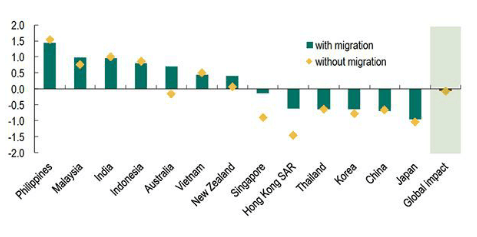
Source: IMF
WHAT WE ARE READING
THE NEW SILK ROADS by PETER FRANKOPAN (Bloomsbury)
With China being frozen out of new telecommunications projects in the old world from Spain to Australia, its capacity to meet its 2025 high tech targets seems likely to depend more on what is happening in emerging market countries, especially in its hinterland. Peter Frankopan’s new book provides a contemporary update of his 2015 history of central Asia which controversially sought to shift the heart of human civilisation east from the Mediterranean crucible of Greece and Rome. He argues that the increasingly obsessive short-term focus on the Trump Administration and Brexit in the past two years has blinded the west to the integration underway in central Asia and more broadly Eurasia. While he concedes that many new agreements and projects lack substance, he argues that the number and diversity of activities now under way is re-establishing this region as the “spine of the world.” He writes: “The themes of isolation and fragmentation in the west stand in sharp contrast to what has been happening along the Silk Roads since 2015. The story across large parts of the region linking the Pacific through to the Mediterranean has been about consolidation and trying to find ways to collaborate more effectively.”
China inevitably looms large in this argument about new global networks, but so too do some of the modern inheritors of the old civilisations Frankopan celebrated in his 2015 history such as Iran and India.
ON THE HORIZON
THAILAND VOTES (finally)
A return to democracy has been delayed six times during the five years of military rule in Thailand, which in turn has been the longest period of formal control by the generals since the 1960s. But that is now set to end with an election on March 24. Three main party groups have emerged as the key competitors. The new Phalang Pracharat will be the vehicle of the pro-military establishment and has drawn about 100 former members of parliament from other parties. The Pheu Thai/Thai Raksa Chat parties associated with exiled former Prime Minister Thaksin Shinawatra will be trying to reclaim their once dominant position with a lot less resources. And the long-established and former ruling Democrats may well emerge as the balancing force between these other two parties. But there are also interesting new players like 40-year-old billionaire Thanathorn Juangroongruangkit’s tech oriented Future Forward. The big question is how much the military will release its grip since it controls the Senate which will play a role in choosing the new prime minster. Military regime leader and former general Prayut Chan-ocha is widely tipped to try to hold on to his position as prime minister.
ABOUT BRIEFING MONTHLY
Briefing MONTHLY is a public update with news and original analysis on Asia and Australia-Asia relations. As Australia debates its future in Asia, and the Australian media footprint in Asia continues to shrink, it is an opportune time to offer Australians at the forefront of Australia’s engagement with Asia a professionally edited, succinct and authoritative curation of the most relevant content on Asia and Australia-Asia relations. Focused on business, geopolitics, education and culture, Briefing MONTHLY is distinctly Australian and internationalist, highlighting trends, deals, visits, stories and events in our region that matter.
Partner with us to help Briefing MONTHLY grow. Exclusive partnership opportunities are available. For more information please contact [email protected]
Read previous issues and subscribe >>
